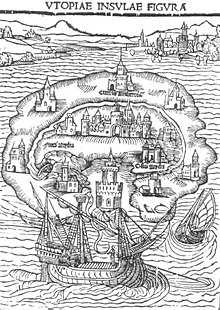Utopia (book)

Illustration for the 1516 first edition of Utopia.
|
|
| Author | Thomas More |
|---|---|
| Translator |
Ralph Robinson Gilbert Burnet |
| Country | Habsburg Netherlands |
| Language | Latin |
| Publisher | More |
|
Publication date
|
1516 |
|
Published in English
|
1551 |
| Media type | |
Utopia (Libellus vere aureus, nec minus salutaris quam festivus, de optimo rei publicae statu deque nova insula Utopia) is a work of fiction and political philosophy by Thomas More (1478–1535) published in 1516 in Latin. The book is a frame narrative primarily depicting a fictional island society and its religious, social and political customs. Many aspects of More's description of Utopia are reminiscent of life in monasteries.
The title De optimo rei publicae deque nova insula Utopia literally translates, "Of a republic's best state and of the new island Utopia". It is variously rendered On the Best State of a Republic and on the New Island of Utopia, Concerning the Highest State of the Republic and the New Island Utopia, On the Best State of a Commonwealth and on the New Island of Utopia, Concerning the Best Condition of the Commonwealth and the New Island of Utopia, On the Best Kind of a Republic and About the New Island of Utopia, About the Best State of a Commonwealth and the New Island of Utopia, etc. The original name was even longer: Libellus vere aureus, nec minus salutaris quam festivus, de optimo rei publicae statu deque nova insula Utopia. This translates, "A truly golden little book, no less beneficial than entertaining, of a republic's best state and of the new island Utopia".
"Utopia" is derived from the Greek prefix "ou-" (οὐ), meaning "not", and topos (τόπος), "place", with the suffix -iā (-ία) that is typical of toponyms; hence the name literally means "nowhere", emphasizing its fictionality. In early modern English, Utopia was spelled "Utopie", which is today rendered Utopy in some editions.
A common misunderstanding has that "Utopia" is derived from eu- (eὐ), "good", and "topos", such that it would literally translate as "good place".
In English, Utopia is pronounced exactly as Eutopia (the latter word, in Greek Εὐτοπία [Eutopiā], meaning “good place,” contains the prefix εὐ- [eu-], "good", with which the οὐ of Utopia has come to be confused in the French and English pronunciation). This is something that More himself addresses in an addendum to his book Wherfore not Utopie, but rather rightely my name is Eutopie, a place of felicitie.
...
Wikipedia
